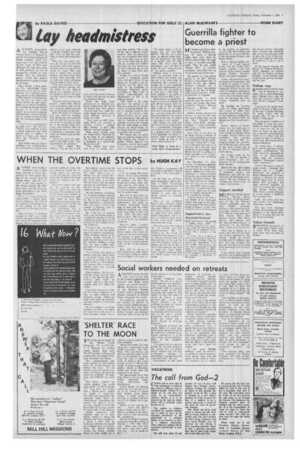Page 3, 7th November 1969
Page 3

Report an error
Noticed an error on this page?If you've noticed an error in this article please click here to report it.
Tags
Share
Related articles
Defending Our School Against Closure
Obituary
Salazar's Portugal Celebrates A Centenary
Centenary Of Teaching Order
Danger In Convent Schools?
Lay headmistress
by PAULA DAVIES
A GLOOMY, grimy-look A GLOOMY, grimy-look ing building, Mount Carmel School is situated in one of the poorer districts of North London. Until two years ago it was the convent of Our Lady of Sion and, although the nuns have gone it still possesses an air of tranquillity, despite its ugly facade and an attractive garden which the present headmistress is going to keep at all costs.
Mary Mullen, a firm, pleasant but undoubtedly tough character, is the only lay headmistress of a Catholic secondary school in the archdiocese of Westminster. A headmistress for the past six years, this school offered her first opportunity of a Catholic headship. It is something she has always wanted to do and having taught in grammar. technical and secondary modern schools. she has always wanted to help the less privileged child to do well.
"I feel I have a contribution to make here," she told me. "I'd like these children to have a better education than their parents had. to achieve as much as I have done despite their less fortunate backgrounds."
Miss Mullen has the kind of problems that headmistresses of predominantly middle-class schools rarely meet, although —and she touched wood rapidly, "I've not had the problems of drugs and pregnancies yet."
What she does have, however, are the sort of girls who are loaded with home responsibilities when they are far too young for them. They may have to collect their younger brothers and sisters from other schools. They probably have to fetch the family allowance because mum is out at work.
They may even have to run errands between parents who are living in two different places. If a younger child in the family is ill it is the elder girl who stays at home to look after it.
"It's never the boys who stay behind," added Miss Mullen with a dangerous glint in her eye. "Girls are always the ones who are burdened in this way."
With 500 pupils, 22 full-time and nine part-time teachers, Miss Mullen has her hands full and she feels she has to delegate much of the pastoral work on to her deputy head, Joan Lowe, who believes with her headmistress that a fair amount of discipline is necessary, provided the children can air their grievances.
"Once you have the discipline," said Miss Lowe, "you can afford to be informal."
"I think," added Miss Mullen, "that the key is that each child has access to me or to Miss Lowe and we are only too willing to listen."
When the sixth form marched in to demand different clothes from the rest of the school they were quietly informed that they could certainly design themselves something different, provided it wasn't too mini.
"They came up with something which was virtually a uniform anyway." laughed Miss Mullen, "a skirt with different coloured junipers."
What about parents, who are traditionally supposed to be the bane of any teacher's life. Are they more or less of a hindrance in a school like Mount Carmel?
"You always have some who come to murder you,"
said Miss Mullen, "but a cup of tea and a cigarette works wonders. There are about five per cent of parents who don't want their girls to go on, usually on the basis that as they will get married why bother? But most are very anxious to see their daughters get on and do better in their lives than their parents."
Getting on as far as Mount Carmel is concerned means that a few girls (10 or 11) are doing two A-levels, a few do 0-levels and the great majority do the Certificate of Secondary Education which, according to Miss Lowe, is greatly under-estimated by educationists as well as by ordinary people.
"This exam is far more geared to the realities of life than the exams set by the university examining boards. If a girl is studying blood in biology" and she waved a complicated-looking set of question,s towards me, "she will not only be expected to study the structure as in 0-level biology but also such things as transfusions and blood banks, all the things that have a meaning in ordinary life as well."
The foreign girls, of whom , there are dozens, ranging from West Indians and, Chinese to Indian, Italian, Spanish and Portuguese, are all encouraged to sit a public examination in their own language. "It's much better to be bilingual, after all," said Miss Mullen. "We also try to help them by offering them facilities for homework and there is a special room set aside where they won't have the distractions they will find at home. We don't insist they use it," she added, carefully.
Nobody seems to insist too much on anything since, as Miss Mullen well knows, you can get a lot more done by persuasion than coercion, although she is now beginning to fed that regimentation, provided there isn't too much of it, isn't such a bad thing. "I think possibly I am more in favour of it now than I was."
Regimentation at school perhaps is a way of keeping the girls off the factory floor for that is one of Miss Mullen's chief ambitions. It's an ambition that is proving successful, too, and only those who don't know the tedium of the factory will jib at the idea of clerical or secretarial work instead.
Miss Mullen also feels that running a Catholic school gives her a considerable advantage over other schools in that there is a general moral consensus which precludes too much argument. "Here we know what we're aiming at even if we don't always achieve it."
Next Week—A Look at a Large Girls Comprehensive.
blog comments powered by Disqus











